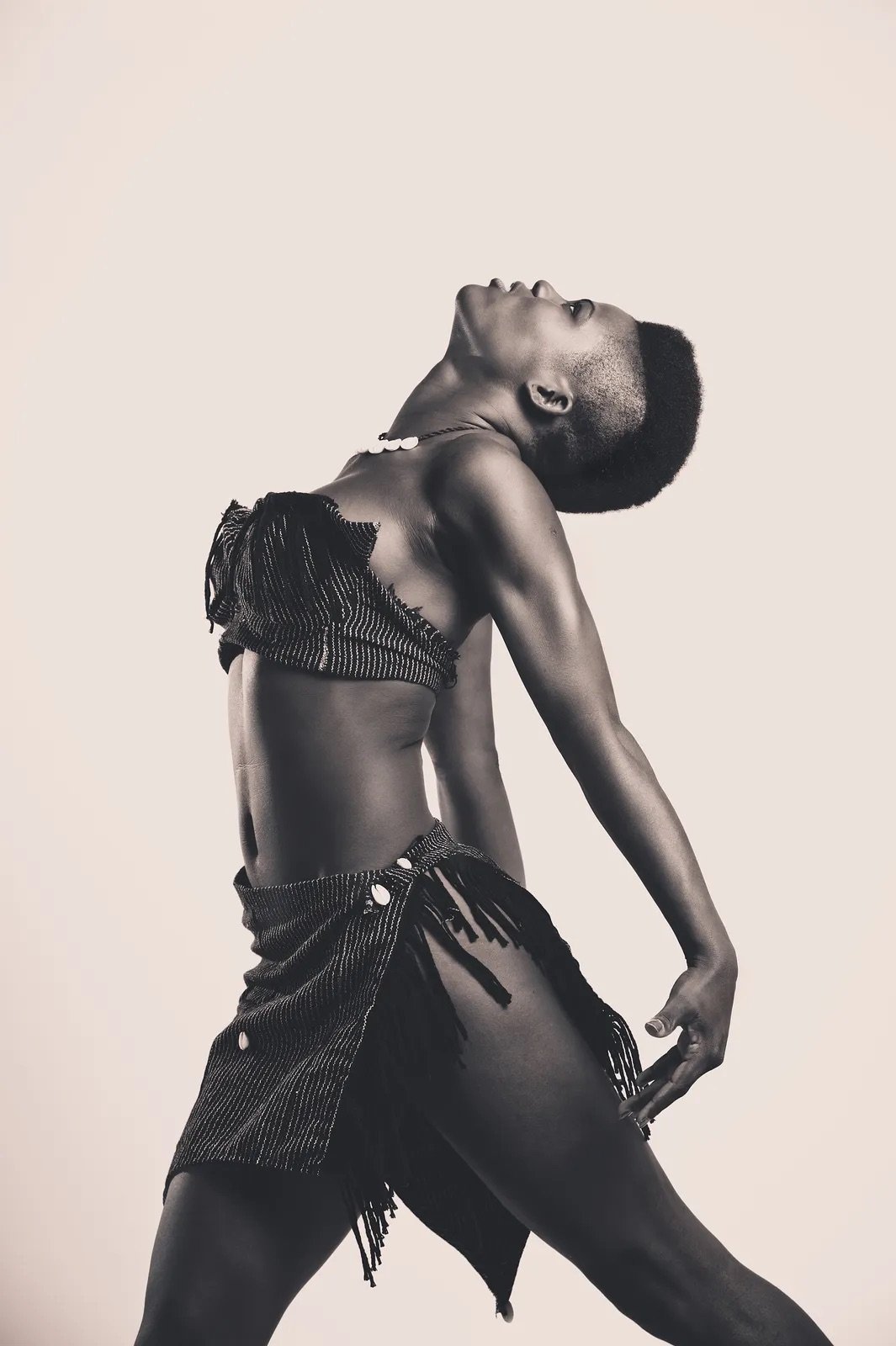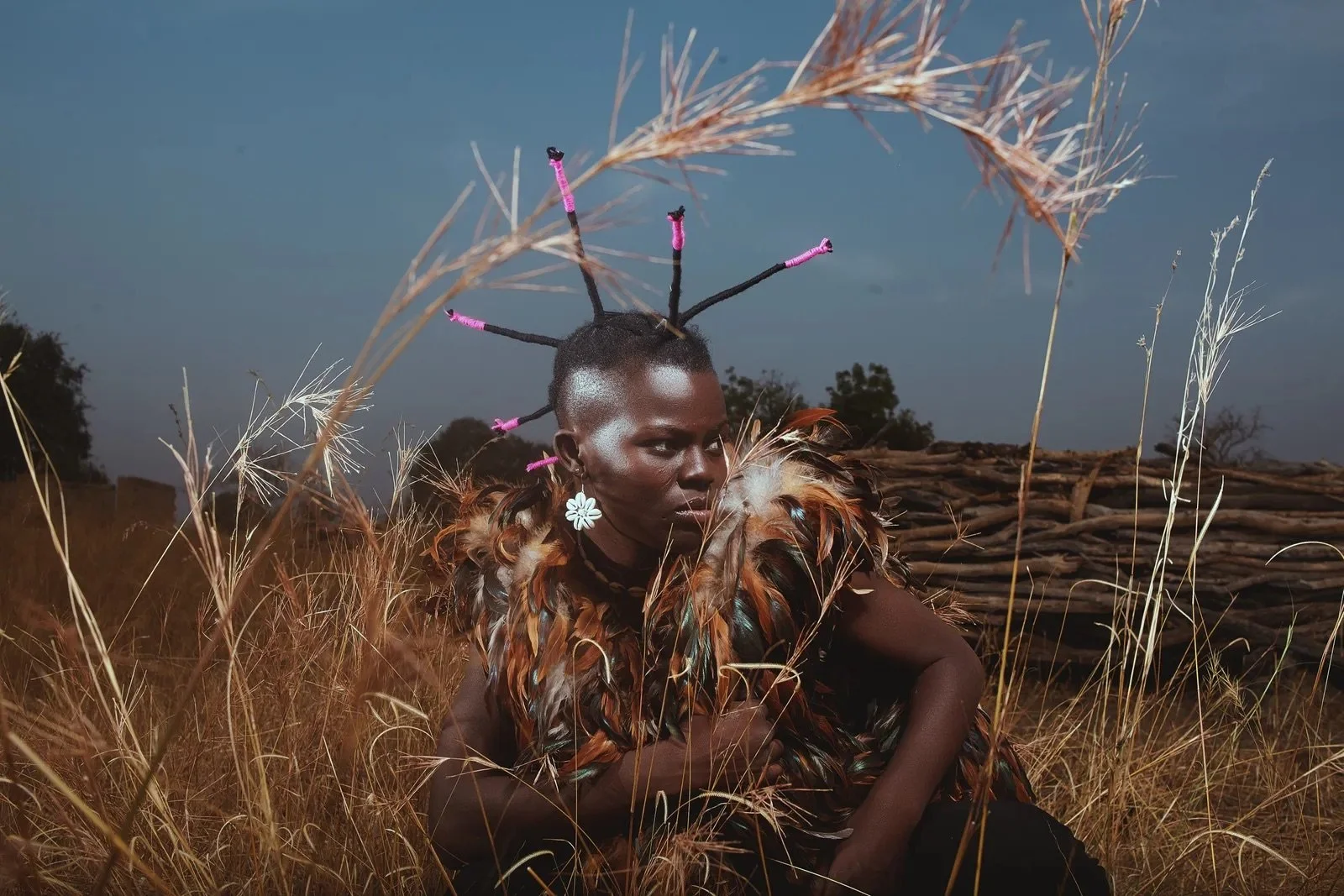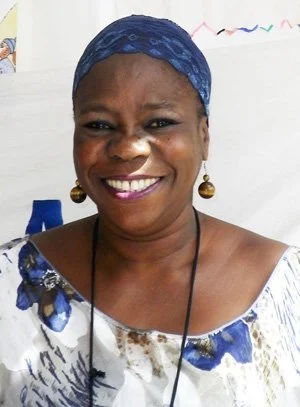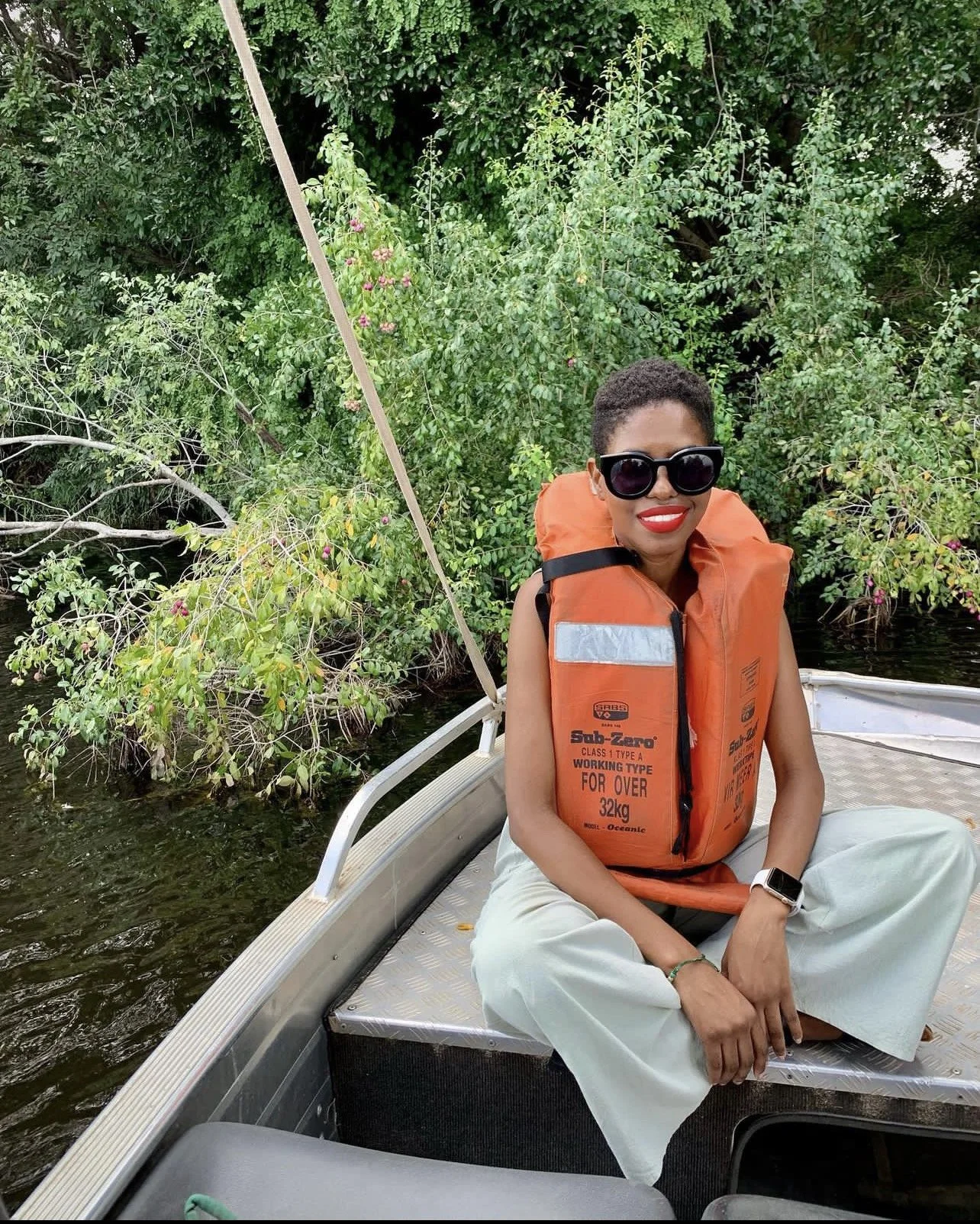“Freedom means I should take responsibility for myself and do things that I believe are good.” - Wiyaala (Ghana) 4/4
/photo source: wiyaala.com
This is the final part of our conversation with Wiyaala, the Lionness of Africa. Wiyaala is from Funsi in the Upper West Region of Ghana. A global icon, she stands out with her distinct voice, her unique style and her dedicated engagement to support girls in her community to achieve their dreams.
In our conversation, she opens up about her childhood and her earliest influences (Part 1), and her journey as an artist, including bold choices about her music and stage persona (Part 2). She also talks about feminism and the work she does to combat child marriage and support girls and women in her community (Part 3). In this fourth part, Wiyaala shares her insights on life, freedom, and the impact she is influencing.
**********
You’re involved in social justice work, and one of the areas that stands out is the issue of child marriages. What inspired you to focus on child marriage as one of the causes you champion through your platform, your music, and your messages?
Well, I have seen child marriage so many times in my community, and in different parts of Africa. And as an African woman, when you go out there sometimes - maybe even all the time - you are like a walking gallery of all the problems and things that have happened. Many people are probably wondering if you have also been through it. Then, you are automatically turned into a mouthpiece. I believe that there are so many young girls who probably have even more talent than me. I have been lucky to have opportunities that they may not have had. So, if I find myself in a position to give a helping hand to a sister, a daughter, to make life better for them, I will do it.
In my community, I can't be the only girl that can sing. I'm sure there are other girls, but they probably don't even know because there's no platform. There's nobody coming back to this community to even give them the time of day. Everything is done elsewhere, maybe in the big cities. I used to watch TV in the village, and they would be airing some children's shows. One day, I asked my mother when they would come to my village to do the show so that we could also perform. My mother would just laugh. Now I understand why she was laughing. The road to my village is not very good. Nobody even knows about Funsi. Even as I got very famous in Ghana, people didn't know where Funsi was until I started singing.
And what does giving a helping hand look like for you?
When I look back and think about all the girls who didn't get a chance, I do what I can to create those opportunities.
When I was a child, I saw girls being taken from the market to be wives almost every market day. One day, it was supposed to be somebody who didn’t live far, and I was actually called to see if I could help, and I did. Then I decided that since nobody was coming to my community, and none of us had been able to do something, I'm going to create that platform that I wanted when I was a kid and I didn't get it. We all care but we can't all be at different places at the same time. So wherever I find myself, maybe I should also add my small contribution. So I decided to build these platforms, starting with an art center in the community to encourage the girls to come on that stage. I created a platform and we have beauty pageants. We have dance competitions. We have a drama club to encourage young girls in particular and also boys to use this platform to gain some self-confidence, show their talent to their parents, show the world, see themselves doing it and see the words of encouragement they are getting from around the world. I believe it will change a lot of things that some of them didn't know about. If I had this platform as a kid, only God knows, I would have cried. That is how I got involved in community and advocacy for the girl child.
Have you seen an impact in your community, especially in terms of child marriage and its prevalence?
For me, the impact has been great. I have seen it ever since we started the Girls’ Club. Actually, I wasn't the one who started this group. When I started going back home, one day about seven girls between the ages of eleven and thirteen came to my house and said, “sister Wiyaala, we are also dancers. We would like you to be our leader and teach us to dance. And when you're doing your shows, we want to come and dance for you.”
I said okay, and each time we danced, they wanted to dance some more. So we formed the Girls’ Club. It was just the girls, and we started performing whenever we could. Their parents were happy, and other parents were like, “but my daughter can dance too, she must join.” Then during one of our performances, we had a talk with the whole community and I gave an example of myself and how all my talents would have been hidden if my parents had married me off. I challenged them to think about how many girls’ dreams they’ve killed with child marriage. I encouraged them to allow the girls to go to school and gain knowledge, so that they would know what to do as they grow up. They will have enough knowledge to choose wisely.
And did that make a difference?
The Club changed a lot of perceptions, because I also told them that their children need to be enrolled in school to join the club. So every child there has gone back to school. Some have become teachers, some are going to become nurses, and it's amazing. I didn’t even get involved financially. Some of the parents have seen what I'm doing, and they believe their daughters matter as much as their sons. They even asked us to also include boys, so we now call the group ‘Girls and Boys Club’. And it's been really good because if you're teaching the girls, the boys should also join so that we teach one another, and change the mentality that girls must do things because they are girls, and boys must do things because they are boys. We get to know how we can all grow in a community and respect one another. We also have people always coming to give us advice and sending things to encourage the children and this helps them to become even more serious. So, that’s the impact for me.
photo source: wiyaala.com
That’s very inspiring. I know you've touched a bit on the commodification of the bodies of female musicians and the timelines they give you within which you bloom. You're putting out your art and expressing yourself, and sometimes people describe it as provocative for a woman of your cultural background. What is your usual reaction to this? And how do you deal with some of those comments?
I accept criticism, because even before I put out a video, I know it's not everybody that is going to like it. I always get people saying, “Oh, you're exposing your body. You're dancing too sexually” and all that. I am aware and it's my art. It’s part of my art. My dance moves, my dressing. What some people term as exposing my body has been done before. I'm not the first to do this. That is how I present my art. When I'm offstage, I'm in my normal clothes. But when I'm going on stage to portray my music and art, which is related to my African culture, all my costumes are inspired by traditional dancers. I enhance the traditional costume to fit my art and my body, because my body is different from any other person’s. So when people say I'm exposing myself, my dressing is not good, they're just hypocrites. And I refuse to agree with them that it’s raunchy.
We have traditional sexy moves, we have traditional sexy songs that we sing so well. I have taken the same thing to the platform, and I'm singing about our culture. So sometimes I just don't let it get to me. It's art, and art can be crazy. I always pray that everybody would look at the beautiful side, but at the end of the day, I've psyched myself not to be angry because it’s not always going to be everybody that agrees with you. I concentrate on the people that see the art for what it is, and I just put my energy there. I don't have time for negativity because it takes me backwards and it’s a place I don't want to go to. I've locked that door. [Laughs]
[Laughs] It was interesting to learn that you design and sew your own stage outfits. How does that make you feel, using your hands and your many talents to create exactly what you want and present yourself that way?
Every time I'm making a costume and I go to pick the fabric, there's this excitement in my heart. I see the design in my head, the colour I want and how it's going to sit on my body. I always want everybody to know I decided to make my own costume by default. Initially, I couldn't make a dress. Well, maybe I could, but I just didn't know. And in those days, I'd go to a tailor or seamstress and they knew I didn't have money so they would have me going back and forth. I could only afford the material and I would ask them to help with making the costumes. If they agreed and I shared what I wanted, they would refuse because they thought I didn’t have money and so, I couldn’t tell them to make me short dresses. They would just make the dress they wanted and tell me to take it. I would then take it home and cut it up into what I wanted. But when the tailor saw that I had cut the dress, they got really mad. This happened twice, and then I realized that I won't get the costumes I wanted from the shops. So I decided to make my own costumes. For the first few ones, I really destroyed the material. I wore it; it was in your face, but it made me stand out immediately. Some people were insulting it and I had to keep explaining until I said you know what, I'm not going to explain myself to anybody. If you don't like it, that's your problem.
I kept doing it and getting better. Today, I have a very clear idea of what I want, and I know the body type I have, so I create what fits me. Now, I use traditional costumes more because it really makes the meaning of the dance and the music go together very well. It's like the music is talking to the dress and the dress is also talking to the music, and that is the power of African music. I design according to the dancing. I do a lot of African dances and I dance with my legs a lot so I cannot wear anything that will restrict my legs from jumping. That is how I make my costumes and I enjoy doing it.
That's wonderful! I know that you make a very intentional choice to honor African traditions and culture - specifically your own culture and tradition - while also pushing against certain things like child marriage that people have seen as part of our culture for a long time. How do you navigate that and create a balance between these two things that are clearly important to you?
I’m able to do that, first with the help of social media, and then the messages in my songs. Yes, this is Africa, and this is who we are. But the world has moved and we have also moved. Yes, we are educated, but that doesn't mean that I will dump my traditional wear and wear only suits. Africa has changed. We have our troubles, but I will also show the positive side of Africa because the negative side has been shown almost every day. There are great Africans doing things; there are beautiful cities, towns, and countries around Africa.
There are some problems that I'm not waiting for anyone to come and help me solve because I know I can solve them myself. Every time I find the opportunity to solve a problem, I solve it. So that the rest of the world knows that we can do our thing. We are not perfect, just like any other place, but don't only project our bad side. That image will haunt us in different ways. So I will not allow that to happen. But at the same time, I do my best to still stay grounded because I'm from a home that will be embarrassed or a bit sad if I do some things that are inappropriate. Staying in my community has also kept me grounded, to always remind me where I came from, how lucky I am to be where I am and how I shouldn’t mess up this opportunity. For some of us, opportunities like this come every once in a while.
So, keeping myself grounded has really helped me balance it all. I’m a human being, and I'm not perfect but I'm trying my best. It's not easy. That's why I can't wait to be able to also mentor one or a few singers, so that when they take on some of the work. I can’t do it alone. I need to involve more young women and even young men to join me in spreading these messages. I hope and I'm praying that I get the strength and the energy to get this done before the Lord calls me one day. [Laughs]
We hope there’s so many more years before that call. You touched on something very important, which is helping other young people, and I had a question about your connection to your community. We've seen videos of you walking in the morning to go get your Waakye and enjoying it. How has your community supported you with your music and also the causes you champion?
The support I'm getting from the community has been good for the past three to four years. It wasn't like that when I moved back home. My community members were not ready to believe that I came home and still mingled with them. They would say things like, “You went to the white man's land. You went to heaven and you're coming back to this hell. This girl is not serious”. When I started with the girls that were dancing, some parents were not very happy. They thought I had failed and came to use the village children for my own gain. They wanted to see me in Europe living the “good life”, so they can believe that they can also go there. When I came back, it was not inspiring for them.
I decided that I was not going to say anything. Just like my name, the doer knows what they're doing. I got my sisters and we started our own thing. We renovated some old buildings by ourselves, and within a few months, people started seeing something. They were like, “Wait a minute. We think this girl is doing something good. We shouldn't be like this. Let's help.” When we were building the Art Center and I explained to them what the center was for, they agreed that we didn't even have a place to meet for entertainment. So they came out and contributed free labor. Women fetched water, and men did the building. Everything changed.
Now if I have a programme with the kids, I always have young boys come in to ask; “what do you need?” And before they realized, people were traveling from different parts of the world to Funsi to come and see the children play. Funsi is on the map. This is just something we all decided to come together to do. I can confidently say that people in Funsi have been very supportive. Ghana has become very supportive. And things are going well. My community members have been very supportive and protective. If you need anything, you just have to say it and they are around to help you. And they've seen the results of whatever impact that we have on the community. So it's become positive.
I’m glad it’s turned towards a positive direction. In a past interview you said, “I want to highlight the freedom to be free. To do things as a young woman.” This resonated, because my feminism is about freedom, liberation. It's about being able to do what I want to do, and achieve my dreams without all the limitations around me simply because I am a woman. What does freedom look like to you?
Oh wow! For me, freedom is… first of all, I'm happy. I'm comfortable and confident. I don't have to fight anybody for anything because I'm a woman. Things should be accessible to me, to exploit without being questioned just because I'm a woman. I should be listened to and taken very seriously, because I also have good ideas. And people should be willing to support me because they know I have something good, and not just because I am a woman.
I should be able to speak my mind confidently without somebody coming to say, “You’re a woman, you can’t say that.” But more importantly, whatever a man can do, I am also going to do the same without being judged. I always say men and women are different. There are certain things that one can do and the other can’t do, and this is because of how we were born… nature. You can't fight the hand of God. But at the end of the day, we are all people and we should be free, given equal opportunities and allowed to try.
Freedom is all of the things that I have mentioned: happiness, freedom to think, freedom to speak, freedom to choose who I want to marry, freedom to have a baby when I want to have it,.. free. Freedom also means I should take responsibility for myself and do things that I believe are good.
And if you had all the freedom in the world today, what is one thing that you would do?
[Laughs] I don’t even know what I would do if I had all the freedom in the world. I would spread as much love as possible. Love will bring peace, joy, and work. It will stop egos, looking down on people, and fighting. When there is love, everybody is calm. With love, they say everything is possible. Everybody will be doing something positive. I will spread a lot of love.
That’s beautiful. And it reminds me; you mentioned that you love motorbikes. Tell us some more about that love.
I grew up riding motorbikes and running errands. I think one of the first things a lot of young people - both young women and men - in my region use is a motorbike. Everybody rides, and you don't even need a teacher. You teach yourself how to ride. Many of us start riding even before we get a license. So some of us really love motorbikes. In fact, we adore motorbikes. They are like number one, before even cars.
In my community, if you really want to impress someone, you buy them a motorbike, and you see the joy in their face. Our roads are such that a bike is faster than a car, so everybody loves it. I have another level of love for motorbikes, because when you ride a bike, it's like you're on top of the world. You're free, you’re flying, and you can feel the air. Motorbikes give me this feeling of freedom. I'm controlling the driver’s seat and I go where I want to go.
It's such a beautiful way to close out our conversation, taking that motorbike as a symbol of freedom. But before that, I’ll ask our Eyala closing question. What is your feminist life motto?
I would say: dare to be different. And I got this from people's words. They used to say, “You're so daring and different.” You don't care what people say. You are doing it in a different way. Don't be afraid to be different when you are doing it. Don't ask for permission. A lot of the time, we do that and we are held back. Just do it. When you are different, it’s good. So dare to be different. Go for it. That's me.
Thank you so much Wiyaala. I really enjoyed this conversation and I hope you enjoyed it as well. Is there something that you came into this interview thinking, “I'm going to talk about this” but our questions haven't led to that answer? This is your moment to share.
What can I say? I think I've said almost everything. Yes, I know sometimes people want to ask whether I’m married or not. That's another freedom part of my mind that I always say: as for that one, I like to keep it private.
[Laughs] And that’s a question we intentionally don’t ask. So we'll agree to keep that one private.
Thank you Jama!
Thank you for the work you do to impact lives, and change communities and mindsets. Thank you so much, Wiyaala.
Enjoy the music!
Love Wiyaala’s music or looking for a chance to discover her incredible talents? Explore some of her songs on her website.
We’d love to hear your thoughts on this fconversation. Let us know in the comments below, or let’s chat on Twitter, Facebook or Instagram @EyalaBlog.








































































